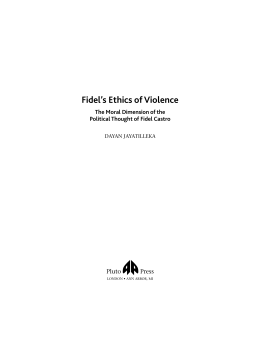
Additional Information
Book Details
Abstract
Fidel Castro's most original contribution to revolutionary and radical thought has been his development of an explicit ethical position on one of the most controversial issues of our time: violence. This book explores the evolution of Castro's political thinking - and in particular how he philosophically reconciles violence, political power and morality.
This book makes a timely intervention into the question of Castro's historical role and contribution. The author argues that Castro's doctrine of armed struggle is the logical development of his idea of the ethical liberation fighter. At its core is an unremitting emphasis on the ethical use of violence.
'In the overcrowded and partisan field of studies of Cuba and of Fidel Castro, it is a genuinely new approach. This book takes us beyond the clichés of authoritarianism or charisma to an analysis of Castro's thought that brings in paradigms from outside the Cuban context and which force us to address conventional wisdoms about the much misunderstood leader'
Tony Kapcia, Head of the Hispanic and Latin American Studies Department, University of Nottingham
'In this lucid analysis of the moral and ethical dimensions of Castro's thought, Jayatilleka breaks new ground'
Dr Julia Buxton, Senior Research Fellow, Department of Peace Studies, University of Bradford
'Puts forward a compelling case for incorporating the ethical component of Castro's practice and thinking, in particular his views on just war and just violence, into a more balanced judgement than is currently available of one of the most controversial statesmen of the twentieth century'
Sebastian Balfour, London School of Economics and Political Science
